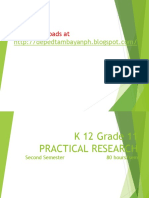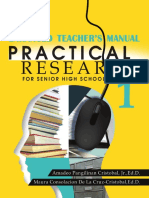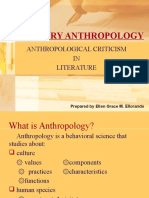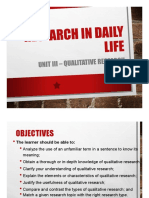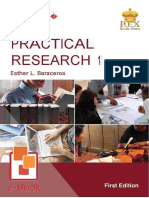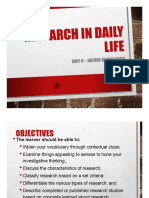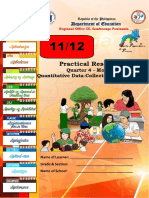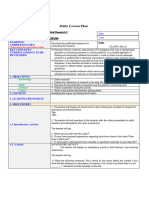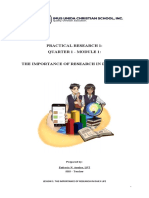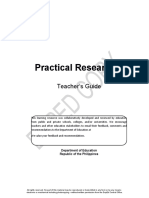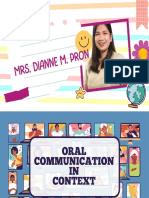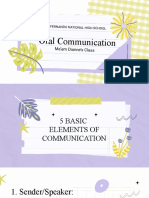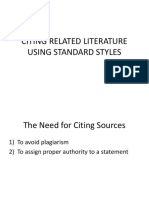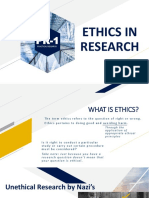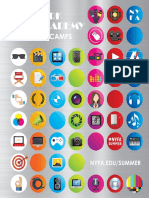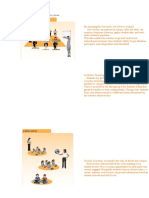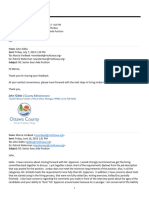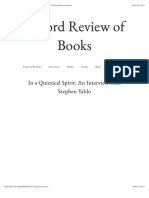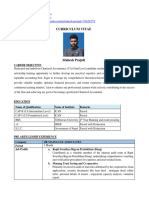Professional Documents
Culture Documents
Practical Research Module 1.f
Practical Research Module 1.f
Uploaded by
Dianne MasapolOriginal Description:
Copyright
Available Formats
Share this document
Did you find this document useful?
Is this content inappropriate?
Report this DocumentCopyright:
Available Formats
Practical Research Module 1.f
Practical Research Module 1.f
Uploaded by
Dianne MasapolCopyright:
Available Formats
MODULE 1 Practical Research 1
For Senior High School
Nature of Inquiry and Research
Week 1/Day 1
________________________________________________________________________
Lesson: WHAT IS RESEARCH?
Content Standards: The learner demonstrates understanding of :
1. the importance of research in daily life
2. the characteristics, processes and ethics of research
3. describe characteristics, processes, and ethics of research
Performance Standard: The learner use appropriate kinds of research in making
decisions.
Competencies: The learner:
1. shares research experiences and knowledge (CS_RS11-111a-1)
2. explains the importance of research in daily life(CS_RS11-
111a-2)
3. describes characteristics, processes, ethics of
research(CS_RS11-111a-3)
Objectives: At the end of the lesson learners will be able to
1. define and explain research;
2. explain the importance of research in the daily life of
individual; and
3. describe the characteristics of research and the goals of
conducting such.
Sources/References: Practical Research 1 for Senior High School, Cristobal-Dela Cruz
Cristobal
INITIAL TASK:
Task 1.1. KWL
Instruction: Answer the question with your family members by constructing the
“KWL” chart then share your answers to the class.
[1] Practical Research 1 for Senior High School Students
MODULE 1 Practical Research 1
For Senior High School
WHAT IS RESEARCH?
KNOW WANT TO KNOW LEARNED
GRADING SYSTEM
CRITERIA PERCENTAGE
Content 40%
Organization of Ideas 20%
Communication Skills 15%
Presentation and Aesthetic Consideration 15%
Behavior 10%
SUGGESTED TASK:
Task 1.2: #RELATE MUCH
Instruction:Identify words that are related to the definition of research by
posting the metacards inside the circle.
Investigation subjective biases
literature theories
System phenomena intuition
guessing factual
Opinions experiences discovery
dreams data
Interview teleserye instrument
productivity validate
[2] Practical Research 1 for Senior High School Students
MODULE 1 Practical Research 1
For Senior High School
Task 1.3. HEART or HURT
Instruction. Drawa on the space provided before the number if you
think the sentence is a description of research and if it is not.
_____1. Research must be hurriedly conducted
_____2.There should be enough data before conducting research.
_____3. Research must observe a step-by-step process.
_____4. The researcher must have the final say in his or her findings.
_____5. A person’s opinion is acceptable and considered as an answer to the
questions asked by the researcher.
_____6.Any concern or issue confronted by the students is researchable.
_____7.The causes why students fail in quizzes are worth researching.
_____8. The student-researcher must read literature related to the problem he or
she is studying.
_____9. The researcher must avoid listening to another researcher to have an
objective view of his or her study.
_____10. The steps in conducting research are patterned.
LESSON INPUT:
PROBING: WHAT IS RESEARCH?
It is defined as the systematic and organized process of collecting, organizing, analysing,
and interpreting data to find answers to our queries.
Research can mean any sort of “careful, systematic, patient study and investigation in
some field of knowledge.”
Research follow a step-by-step process of investigating that uses a standardized approach
in answering questions or solving problems (Polit&Beck, 2004)
FINAL TASK
Task 1.3. APPLICATION
Learners check tasks 1.1 and 1.2 and synthesize their answers using the words from tasks
1.1 and the statements from tasks 1.2.to formulate a good and acceptable definition of
research.
________________________________________________________________________
________________________________________________________________________
________________________________________________________________________
[3] Practical Research 1 for Senior High School Students
MODULE 1 Practical Research 1
For Senior High School
Day 2
__________________________________________________________________________
Lesson: WHY DO WE RESEARCH?
Content Standard: The learner demonstrates understanding of
1. the importance of research in daily life
Performance Standard: The learner use appropriate kinds of research in making decisions.
Competencies: The learner:
1. shares research experiences and knowledge (CS_RS11-111a-1)
2. explains the importance of research in daily life (CS_RS1111a-
2
Lesson Objective: Explain the importance of research in the daily life of individual
INITIAL TASK.
TASK 1.4. WATCH A NEWS VIDEO ABOUT URBAN FARMING AND BE
GUIDED BY THE FOLLOWING QUESTIONS. (Video is on the CD)
1. What is the news video all about?
2. What is the problem posted in the video?
3. How did the citizen address the problem?
SUGGESTED TASK:
Task 1.5. FINDING THE VALUE OF X and Y?
Instruction: look around the classroom and find something which you think is a product
of research and explain its importance in their lives.
CRITERIA PERCENTAGE
Content 40%
Organization of Ideas 20%
Communication Skills 20%
Presentation and Aesthetic Consideration 15%
[4] Practical Research 1 for Senior High School Students
MODULE 1 Practical Research 1
For Senior High School
LESSON INPUT:
Importance of Research
1. Research provides a scientific basis for any practice or methodology in any field or
discipline.
2. Research is undertaken for the continuous development and further productivity in any
field.
3. Research help develop tools for assessing effectiveness of any practice and operation
4. Research provides solutions to problems concerning almost all issues encountered in the
different areas of work.
5. Research impacts decision-making.
6. Research develops and evaluates alternative approaches to the educational aspects of any
discipline
7. Research aims to advance the personal and professional qualifications of practitioner.
TASK. 1.6. SOMETHING TO THINK ABOUT.
Instruction: Write a 250-word essay discussing the importance of research in their
education as a student.
ESSAY RUBRIC
FEATURES EXPERT ACCOMPLISHED CAPABLE BEGINNER
(4) (3) (2) (1)
QUALITY Piece was Piece was written Piece had Piece had no
OF WRITING written in an in an interesting little style or style or voice
extraordinary style and voice voice
style and
voice
Somewhat Gives no
Very informative and Give some new
informative organized new information
and well information and very
organized but poorly poorly
organized organized
GRAMMAR Virtually no Few spelling and A, number So many
USAGE AND spelling, punctuations, of spelling spelling,
MECHANICS punctuation errors, minor punctuation punctuation
or grammatical errors or and
grammatical grammatical grammatical
errors errors errors that
interfere with
the meaning
[5] Practical Research 1 for Senior High School Students
MODULE 1 Practical Research 1
For Senior High School
Day 3-4
Lesson: WHAT DOES IT TAKE TO BE A
RESEARCHER?
Content Standard: The learner demonstrates understanding of the characteristics,
processes, and ethics of research
Performance Standard: The learner use appropriate kinds of research in making decisions.
Competencies: The learner describes characteristics, processes, and ethics of
research.(CS_RS11-III-3)
Lesson Objective: To be able to describe the characteristics of a researcher
Sources: https://migomendoza.weebly.com/uploads/5/4/7/4/54745209/chapter_1-
the_nature_of_inquiry_and_research.pdf
http://www.scribd.com/document/330269339/k-12-Grade-11-Practical
research1
INITIAL TASK:
TASK 1.7
For each of the skills, give yourself a grade on a scale of 1 (low) to 10 (high)
Which skills do you consider yourself to be best at? Work independently.
Reading
Observing
Listening
Watching
Choosing
Questioning
Summarizing
Organizing
Writing
Presenting/Communicating
SUGGESTED TASK:
TASK 1.8. DYAD
Work with a partner and use this tool to conduct a survey of your co-learner’s
characteristic as a researcher.
[6] Practical Research 1 for Senior High School Students
MODULE 1 Practical Research 1
For Senior High School
Instruction: Put a check on the corresponding column of your answer.
RESEARCHER IS… YES NO
1. Always curious and wants to find out the intricacies
of things
2. Does thing right
3. Does not readily accepts conclusions
4. Follows the scientific methods in finding out
answers to questions
5. Does the right thing
6. Responds to the challenges of the modern world
7. Makes use of the available materials to compensate
for the things needed.
8. Makes use of the creativity to think of unique ways
in order to solve a problem
9. Reports the truthor whatever may be the outcomes.
10. Faithful to do and finish the task
What have you found out? ______________________________________________________
LESSON INPUT
Use this acronym to remember the characteristics of a successful researcher
R-esearcher Oriented
E- fficient
S-cientific
E-ffective
A-ctive
R-esourceful
C-reative
H-onest
E-conomical
R- Religious
FINAL TASK:
TASK 1.9. MEET AND GREET
Instruction:
1. Conduct a 5- minute personal interview with a professional or researcher in
your community who had conducted a study and research in any areas. (arts,
humanities, sports, science, business, agriculture and fisheries, information,
and communication technology, and social inquiry. Focus your interview on
[7] Practical Research 1 for Senior High School Students
MODULE 1 Practical Research 1
For Senior High School
the characteristics of a successful researcher, roles of a researcher and
anything relative to the conduct of research.
2. Ask permission to take photos/video while conducting the interview.
3. Formulate your questions that would primarily attain your purpose.
4. Submit your output on a CD/ the transcript.
5. Work with your family members.
6. Present it to the class.
Scoring System
Criteria
Content 40%
Organization of Ideas 20%
Communication Skills 15%
Presentation and Aesthetic 15%
Consideration
Behavior 10%
Week 2/Day 1-4
___________________________________________________________________________
Lesson: RESEARCH PARADIGM AND OUTLINE
Content Standard: The learner demonstrates understanding of the characteristics,
processes, and ethics of research.
Performance Standard: The learner use appropriate kinds of research in making decisions.
Competencies: The learner describes characteristics, processes, and ethics of
research.(CS_RS11-IIIa-3)
Lesson Objective: To be able to describe the research process
Source/ References:
https://migomendoza.weebly.com/uploads/5/4/7/4/54745209/chapter_1-
the_nature_of_inquiry_and_research.pdf
[8] Practical Research 1 for Senior High School Students
MODULE 1 Practical Research 1
For Senior High School
INITIAL TASK:
TASK 1. 10. ENCIRCLE WORDS RELATED TO RESEARCH.
E R Y U N P E B D S X B N I
R E S E A R C H D E S I G N
I E F M K O O K K D D G H N
G F V R B V B V N V D E Y
T C O N C L S I O N O I I M
Q W B J H E N F F X E C H V
M P R W M R X U I O P M N
K F R A M E W O R K J K M Y
W R Y E M N P W E X C V B M
M E T H O D O L O G Y E T T
SUGGESTED TASK
Read and understand the text. Choose an appropriate graphic organizer to explain the
research process. Work with your family members.
The research paradigm is an outline address the purpose the researcher must
that guides the researcher in conceptualizing and formulate necessary questions that will help
conducting the research. An effective research distinguish the significant points of the research.
must address these two important aspect: The research questions may either framed in a
research foundations and research methodology. quantitative (how much, how often, to what
extent) or qualitative (what, why and how)
The research foundations refer to the manner. The possible answers to the research
fundamental components of research such as the questions are the hypotheses, which will be
research problem, purpose, specific questions to either confirmed or rejected by the data collected
be addressed and the conceptual framework to in the study. Lastly, the conceptual framework
be applied. is an outline or paradigm that presents the topics
In determining the research topic or problem, the to be studied, the various variables and context,
researcher must look at a significant real life how these relate to influence each other.
problem. Formulating research problem On the other hand, the research methodology
requires describing the undesirable situations describes how the researcher will answer the
related to the problem and the needed research question in a credible manner. Research
knowledge or information in order to solve that methods are employed to address the research
problem. The purpose of the research describes purpose and gain new information and insights
how the study will fill this “knowledge gap”. To to answer the problem. The methodology of the
[9] Practical Research 1 for Senior High School Students
MODULE 1 Practical Research 1
For Senior High School
research includes the review of literature, research problem, purpose, and questions.
research approach and design, data collection, Having the best way to gather the data, the
methods of analysis, and conclusions. researcher will proceed to the data collection.
Data collected will then undergo data analysis,
The review of literature analyses the existing which consist of the strategies and methods that
knowledge regarding the research topic. It makes sense of the data to answer the research
identifies gaps in information that may be problem and questions. Finally, the conclusion
addressed by the research. It is also an important summarizes the key results of the study and
basis of the conceptual framework of the study. discusses how these are relevant to the research
With the existing knowledge about the study, the problem. At this point, the research address the
research approach and design identifies what hypotheses and determines if they are accepted
is the means to collect and analyse data in the or rejected. It also address es the knowledge
study. The design is used to clarify and improve gap and presents new insights into the problem.
(PR1 for Senor High School by Cristobal-Dela Cruz Cristobal)
SUGGESTED TASK:
WALK THROUGH
Read the different chapters of the research paper outline.A research paper is divided into
chapters which are then subdivided into various components of the research study. The following
is the conventional outline of an academic research paper:
Chapter 1. The problem and Its Background
a. Introduction, Background of the Study
b. Statement of the Problem
c. Scope and Delimitation
d. Significance of the Study
Chapter 2: Theoritical Framework
a. Review of Related Literature
b. Review of Related Studies
c. Conceptual /Theorictical Framework
d. Hypothesis of the Study
e. Assumptions of the Study
f. Definition of Terms
Chapter 3: Research Methodology
a. Research Design
b. Respondents of the Study
c. Instrument of the Study
d. Validity and Reliability
e. Statistical Treatment
Chapter 4: Presentation, Analysis, and Interpretation of Data
a. Presentaion of Data
b. Analysis
[10] Practical Research 1 for Senior High School Students
MODULE 1 Practical Research 1
For Senior High School
c. Interpretation
d. Discussion
Chapter 5: Summary, Conclusions, and Recommendations
a. Summary of Findings
b. Conclusions
c. Recommendation
LESSON INPUT:
CHARACTERISTICS OF RESEARCH
1. Realistic- the result of an investigation should be based on actual which was gathered by
the research himself
2. Logical – Research should follow valid procedures and principles
3. Cyclical – It starts with a problem and ends with another problem
4. Analytical-Before making conclusion, the researcher must make sure that all acceptable
procedures in data gathering have been employed correctly.
5. Objective- Objectivity is defined as the lack of bias or prejudice
6. Critical –establish a high level of confidence with regards to the data gathered
7. Replicable – It must be written in such a way that other researchers can perform the same
study having the same results as the original research.
FINAL TASK:
Be able to explain the Research Cycle creatively. Collaborate with your family members.
[11] Practical Research 1 for Senior High School Students
MODULE 1 Practical Research 1
For Senior High School
Week 3 Day 1-4
______________________________________________________________________________
Lesson: Ethics in Research
Content Standard: The learner demonstrates understanding of describe characteristics,
processes, and ethics of research
Performance Standard: The learner use appropriate kinds of research in making decisions.
Competencies: differentiates quantitative from qualitative . (CS_RS11-IIIa-4)
Specific Objective: a. At the end of this module learners should be able to discuss the
importance of ethics in research.
b. explain the ethical codes in theconduct of research, and the
rights of research participants;
c. discuss the importance of ethics in research
d. define plagiarism and identify techniques to avoid it
Source/ Reference: Practical Research 1 for Senior High School, Cristobal-Dela Cruz-
Cristobal
INITIAL TASK:
A. Read and analyse the article below and then anser the guide questions that follow.
Ethics in Qualitative Research
Ethical issues are present in any kind the disclosure of the 40-year study caused
of research. The research process creates public outrage (Caplan, 1992
tension between the aims of research to Another example of unethical
make generalizations for the good of others, research is the experiment conducted
and the rights of participants to maintain between 1950 and 1952 , in which more than
privacy. Ethics pertains to doing good and 1,000 pregnant women were given
avoiding harm. Harm can be prevented or diethylstilbestrol to prevent miscarriages.
reduced through the application of These women were subject to a double-blind
appropriate ethical principles. Thus, the study without consent. Only 20 years later,
protection of human subjects or participants when the children of these women had high
in any research study is imperative. rates of cancer and other abnormalities, did
Violations of human rights in the the participants learn they were subjects of
name of scientific research have been among these experiments (Capron, 1989)
the darkest events in history. From 1932 t0 The nature of ethical problems in
1972, more than 400 African-American qualitative research studies is subtle and
people who had syphilis were deliberately different compared to the problems in
left untreated to study the illness. Although quantitative research. For example, potential
the Tuskegee syphilis study was sponsored ethical conflicts exist in regard to how a
by the United States Public Health Service, researcher gains access to a community
[12] Practical Research 1 for Senior High School Students
MODULE 1 Practical Research 1
For Senior High School
group and in the effects the researcher may Qualitative health research is focused
have on participants. The literature provides on the experiences of people in relation to
few examples of ethical issues in qualitative health and illness. Yet, nurse researchers
health research. Punch (1994) claimed that may find that their roles as researchers and
one hardly ever hears of ethical failures in as clinicians may be in conflict. Qualitative
qualitative research. Howerver, Batchelor studies are frequently conducted in settings
and Briggs (1994) claimed that the failure of involving the participation of people in their
researchers to addrss ethical issues has everyday environments. Therefore , any
resulted in those researchers being ill- reseach that includes people requires
prepared to cope with the unpredictable awareness of the ethical issues that may be
nature of qualitative research. Qualitative derived from such interactions. Ethics in
reseachers focus their research on exploring, health research includes appropriateness of
examining, and describing people and their the research design, the methodological
natural environments. Embedded in design, the funding sources, and the
qualitative research are the concepts of behaviors in reporting data. The purpose of
relationships and power between researchers this paper is to show these related ethical
and participants. The desire to participate in issues and principles to be used in
a research study depends upon a qualitative research. (Orb, 2000)
participant’s willingness to share his or her
own experience. Nurse researchers have to
balance research principles as well as the
well being of clients. (Ramos, 1989).
Source: Ehics in Qualitative Research by A. Orb, L. Eisenhauer,and D. Wynaden (2000)
GUIDE QUESTIONS
1. Based on the Article, how will you define ethics in research?
_____________________________________________________________
2. Are the Tuskegee syphilis study and diethylstilbestrol study on pregnan women unethical why?
3. If you were part of the research teams who conducted the research studies, what will you do to
correct the unethical aspect of the experiments?
__________________________________________________________________
[13] Practical Research 1 for Senior High School Students
MODULE 1 Practical Research 1
For Senior High School
SUGGESTED TASK:
Determine the appropriate ethical action to address the unethical practices
described below. Write your answers in these spaces provide.
UNETHICAL PRACTICE ETHICAL ACTION
1. Jaypee, a senior high school student
is planning to conduct his first
research on the misbehaviour of
fellow students during
examinations. However, he has no
idea on the ethical guidelines in
concducting such research.
2. Because of non-participation in
extra curricular,Trey an honor
student, ranked last in the honor
roll. A qualitative research about
Trey is conducted without
informning him.
3. Gabby, a graduating student,
claimed the research work of his
classmate. He erased the name of
the original researcher and placed
his own.
4. A group of senior high school
students secretly chose their teacher
as the subject of their teacher as the
subject of their research.
5. To maximize the particpants in her
study, Pauline, the class
valedictorian, forced her classmates
to join her study
LESSON OUTPUT:
A. Importance of Ethics: ( Resnik (2007) in his article “What is Ethics in
Research & Why is it important?
1. It promotes pursuit of knowledge, truth, and credibility
2. Many of the ethical norms ensure that researchers are held accountable to the
public
3. Adherence to ethical principles helps public build support for research.
B. ETHICAL CODES AND POLICIES FOR RESEARCH
1. honesty
2. objectivity
[14] Practical Research 1 for Senior High School Students
MODULE 1 Practical Research 1
For Senior High School
3. integrity
4. care
5. openness
6. care
7. respect for intellectual property
8. confidentiality
9. responsible publication
10. responsible mentoring
11. respect for colleagues
12. social responsibility
13. non-discrimination
14. competence
15. legality
16. human subject protection
C. ETHICAL STANDARDS IN RESEARCH WRITING
Following reminders must be taken into consideration for ethical research writing
(Logan University, 2016)
1. Findings should be reported with complete honesty.
2. Intentional misinterpretation, misinformation, and misleading claims must be
avoided.
3. Appropriate credit shoul be given when usig other people’s work.
4. Plagiarism should be avoided by fully acknowledging all content belonging to
others
D. PLAGIARISM AND INTELLECTUAL PROPERTY
Plagiarism- act of usig another person’s ideas, words, processes, and results
without giving due credit.
The following are considered act of Plagiarism:
a. Claiming authorship of a work done by another person
b. Copying an entire written work or a portion of it.-including words, sentences,
and ideas without acknowledging the author.
c. Failing to put quotation marks to distinguish a quotation taken directly from
source.
d. Giving incorrect information about the source of a quotation.
e. Merely changing the words but retaining the sentence structure so that the
selection or quotes still bears a resemblance to the original source.
f. Using so many words and ideas from the orginal source that it makes up a
large portion of your work, eve if you acknowledge the original author.
Plagiarism should not be tolerated as the unauthorized use of original ideas and
works constitutes a violation of intellectual property rights.
“ Intellectual property refers to the creations of the mind: inventions; literary and artisitic
works, and symbols, names, images used in the commerce: (WIPO, 2004)
[15] Practical Research 1 for Senior High School Students
MODULE 1 Practical Research 1
For Senior High School
In academic research, plagiarism and its related acts constitute academic
dishonesty and may be cause for the invalidation of a research study and other sanctions
on the offender.
FINAL TASK:
Complete the following phrases by referring to the ethical principles for research.
1. When I conduct research, I will
__________________________________________________________________
__________________________________________________________________
_____________________
2. The participants of my study will be
__________________________________________________________________
__________________________________________________________________
___________
3. To finally arrive at the best findings, I will
__________________________________________________________________
Week 3/Day 1-4
________________________________________________________________________
Lesson: Types of Research
Content Standard: The learner demonstrates understanding of the kinds of
research across fields
Performance Standard: The learner is able to use appropriate kinds of research in
making decisions
Competencies: Provide examples of research in areas of interest (arts,
humanities, sports, science, busniness, agriculture and
fisheries, information, and communication technology, and
social inquiry) (CS_RSS-IIIa-5)
Objective: At the end of the lesson the learners shall be able to
differentiate
quantitative from qualitative research
Sources/References
https://migomendoza.weebly.com/uploads/5/4/7/4/54745209/chapter_1-
the_nature_of_inquiry_and_research.pdf Practical Research for Senior
High School, Cristobal-Dela Cruz-Cristobal
[16] Practical Research 1 for Senior High School Students
MODULE 1 Practical Research 1
For Senior High School
INITIAL TASK:
Fill out the following “word shapes” by referring to the clues and guessing the
types of research hinted.
1. Conducts practical methods as substitutes for fundamental and theoretical
approaches
r s c
2. Explains the simple units of experience have complex meanings
P m g a
3. Compares collected units of data with one another to arrive at hypothesis
o d h
4. Emphasizes the complexity of humans
l t e
5. Involves collection and analysis of data from cultural groups
t r
6. Seeks to explain naturally occurring phenomena in the natural world
c n f
7. Challenges the traditional qualitative analysis approach
S d n
8. Utilizes deductive reasoning to generate tested predictions
q t e
9. Involves analysis of data from the past
S r a
10. Provides background data for broader studies
C t
SUGGESTED TASK:
Complete the box by filling out the missing characteristics of qualitative or quantitative
research
Quantitative Qualitative
1. Usually concerned with generating
hypothesisfrom data rather than testing a
hypothesis
Has high output replicability 2.
Methods includes census, survey, 3.
experiments, and secondary analysis
[17] Practical Research 1 for Senior High School Students
MODULE 1 Practical Research 1
For Senior High School
4. Uses more flexible processes
Use large sample sizes that are 5.
representative of the population
6. Uses either unstructured or semi-structured
instruments
Aims to characterize trends and patterns
7.
LESSON INPUT:
LESSON INPUT:
COMMON TYPES OF QUALITATIVE RESEARCH
The following are the various types of qualitative research based on the different fields of
inquiry (Meria, S.B., et al, 2002)
1. Experimental-It is the most conclusive of scientific methods. Because the researcher
actually establishes different treatments and then studies their effects, results from this
type of research are likely to lead to the most clear-cut interpretation.
2. Phenomenological study- This type of research seeks to find the essence or
structure of an experience by explaining how complex meanings are built out of
simple units of inner experience. It examines human experiences (lived
experiences) through the descriptions provided by subjects or respondents. The
goal of study is to describe the meaning that experiences hold for each subject.
Some of the areas of concern for these studies are humanness, self determination
, uniqueness, wholeness,and individualism.
3. Ethnographic study- this study involves the collection and analysis of data about
cultural group or minorities. The researcher immerses with the people and become
a part of their culture. He/She becomes involved in the everyday activities of the
subjects , and gets to emphasize with the cultural groups experiencing issues and
problems in their everyday lives.The researches talks with the “key informant”
who provides with the important information for the study. Thus study is
primarily done to develop cultural theories.
Example: What is the demographic profile and migratory adaptions of squatter
families in Barangay Cutcut, Angeles City ( dela Cruz, 1994)
4. Historical Study-It is the systematic collection and evaluation of data to describe,
explain, and thereby understand actions or events that occurred sometime in the past.
Zweck:
a. To make people aware of what has happened in the past so they may learn from
past failures and successes
b. To learn how things were done in the past to see if they might be applicable to
presentday problems and concerns.
c. To assist in prediction
d. To test hypothesis concerning relationships or trends.
[18] Practical Research 1 for Senior High School Students
MODULE 1 Practical Research 1
For Senior High School
Example: In the early 1900s, most female teachers came from the upper middle
class, but most male teachers did not.
e. To understand present educational practices and policies more fully.
5. Action Research-Action Research is conducted by one or more individuals or groups
for the purpose of solving a problem or obtaining information in order to inform local
practice.
Those involved in action research generally want to solve some kind of day-to-day
immediate problem, such as how to decrease absenteeism or incidents of vandalism
among the student body, motivate apathetic students, figure out ways to use technology
to improve the teaching of mathematics, or increase funding.
6. Narrative Analysis- The main source of data for this type of research are the life
accounts of individuals based on the their personal experiences. The purpose if
the study is tot extract meaningful context from these experiences.
Types
a. Psychological- this involves analysing the story in terms of internal
thoughts and motivation. It also analyses the written text or spoken
words for its component parts of patterns.
b. Biological – This takes the individuals’s society and factors like
gender and class into account.
c. Discourse analysis- this studies the approach in which language is used
in the texs . and context
7. Critical Qualitative- This type of research seeks to bring about change and
empower individuals by describing and critiquing the social, cultural, and
psychological perspectives on present -day contexts . As such, it ultimately
challenges the current norm, especially on power distributions, building upon the
initial appraisal of the said present day perspectives.
FINAL TASK:
A. Identify which research design is referred to by the following statements. Write
your answers on the blank
___________1. The design studies a group over a long period of time.
___________2. The research focuses on a group of people sharing common
characteristics.
___________3. This research identifies a problem, implements a solution, and
studies its effects.
___________4. In this design, the researcher manipulates the variables and
determines its effects.
___________5. This research is done in stages in order to gather sufficient data.
__________ 6. The design seeks to establish and explain a “cause and effect”
relationship
__________7. This research looks into a large group of people with different
characteristics
[19] Practical Research 1 for Senior High School Students
MODULE 1 Practical Research 1
For Senior High School
___________8. This design aims to ascribe the present situation in order to gain
information about phenomenon.
___________9. This research focuses on problems or topics with little or no
research done about them, gathers information that will guide future studies.
__________10. This design combines elements from various research designs and
uses both qualitative and quantitative methods.
B. Read and analyse the following research topics and identify what type of
qualitative research is appropriate for them. Then justify your answer by
providing a brief explanation.
___________1. A researcher investigated the medical properties of the rare
Amazonian tree and discovered that its components can be made into a drug that
cure dengue.
___________________________________________________________________
__________________________________________________________________
___________2.A researcher is looking into ways to create intervention on violent
or hostile behaviour among young children.
____________3. A researcher analyses music composition by researching on its
utilization of theory and intuition, technologies in creating music, and critical
approach in its design process.
____________ 4. A researcher immerses with the Badjao street dwellers to learn
how they were able to migrate from Mindanao.
____________ 5. A researcher seeks to discover the events that transpired behind
the assassination of Antonio Luna in Cavite in 1899 and discuss the implication of
these events to history.
[20] Practical Research 1 for Senior High School Students
You might also like
- Practical Research 1 PDFDocument174 pagesPractical Research 1 PDFFaith Joy Floro Cosip80% (128)
- Curriculum Map Practical Research 1Document4 pagesCurriculum Map Practical Research 1Kaneesha Sobreviñas100% (1)
- Practical Research 1 - Quarter 1 - Module 2 - Qualitative Research and Its Importance To Daily Life - Version 2 PDFDocument30 pagesPractical Research 1 - Quarter 1 - Module 2 - Qualitative Research and Its Importance To Daily Life - Version 2 PDFYanexAlfz77% (102)
- 5e Lesson Plan For Music ChoirDocument4 pages5e Lesson Plan For Music ChoirCamille ComasNoch keine Bewertungen
- Practical Research 1 Module 3 - REVISEDDocument22 pagesPractical Research 1 Module 3 - REVISEDALEX PANERIO90% (10)
- K 12 Grade 11 Practical Research 1 SimplifiedDocument41 pagesK 12 Grade 11 Practical Research 1 SimplifiedDickerson Vallejos Manalo91% (479)
- Research in Daily Life 1 2020Document73 pagesResearch in Daily Life 1 2020Sai88% (8)
- Practical Research 1 - Quarter 1 - Module 4Document18 pagesPractical Research 1 - Quarter 1 - Module 4Lorde Jester Simon85% (13)
- MODULE-11 Practical Research PDFDocument123 pagesMODULE-11 Practical Research PDFAlyssum Marie91% (11)
- Module 1 Types of Qualitative ResearchDocument5 pagesModule 1 Types of Qualitative ResearchMc Jansen Cadag0% (1)
- Applied - 11 - Research in Daily Life 1 - semII - CLAS4A - The Range of Research Topics in The Area of Inquiry - v6 PNSDocument19 pagesApplied - 11 - Research in Daily Life 1 - semII - CLAS4A - The Range of Research Topics in The Area of Inquiry - v6 PNSVienie Ramirez Badang100% (1)
- Practical Research 1 OutlineDocument5 pagesPractical Research 1 OutlineCharlesVincentGalvadoresCarbonell100% (4)
- GRADE 11 (AS 01) : Module 1: First QuarterDocument30 pagesGRADE 11 (AS 01) : Module 1: First QuarterLans Ilyn100% (4)
- Practical Research 2Document127 pagesPractical Research 2Zeru Vill50% (2)
- Structure and Functions of Mitochondria Poster PDFDocument1 pageStructure and Functions of Mitochondria Poster PDFnoatomNoch keine Bewertungen
- Writing Chapter 4 - Analysis of Data (Qualitative)Document8 pagesWriting Chapter 4 - Analysis of Data (Qualitative)Jing CruzNoch keine Bewertungen
- Quiz # 1 (Lessons 1 and 2) - Practical Research 2Document2 pagesQuiz # 1 (Lessons 1 and 2) - Practical Research 2Ariel Nube100% (4)
- Dlp-Practical Research 1Document4 pagesDlp-Practical Research 1Noj Cire Lumanzo-Lumanao Amzn100% (2)
- Anthropological Criticism in LiteratureDocument15 pagesAnthropological Criticism in LiteratureEllen Grace Ellorando Mora0% (1)
- 1981 Understanding and Changing Homosexual Orientation Problems LDS Social ServicesDocument46 pages1981 Understanding and Changing Homosexual Orientation Problems LDS Social ServicesPizzaCowNoch keine Bewertungen
- Practical Research 1 - Quarter 1 - Module 1 - Nature and Inquiry of Research - Version 3Document52 pagesPractical Research 1 - Quarter 1 - Module 1 - Nature and Inquiry of Research - Version 3Gerson Tampolino Acosta91% (23)
- Teachers' Guide Practical Research 1Document8 pagesTeachers' Guide Practical Research 1Emelita Paronda83% (6)
- LESSON 3.qualitative ResearchDocument23 pagesLESSON 3.qualitative Researchwyrmczar63% (8)
- Practical Research 1Document40 pagesPractical Research 1Elias Vargas100% (2)
- Practical Research: Esther L. BaracerosDocument185 pagesPractical Research: Esther L. BaracerosAdjanie ShainaNoch keine Bewertungen
- Practical Research 1 - Quarter 1 - Module 3 - Identifying The Inquiry - Version 3Document44 pagesPractical Research 1 - Quarter 1 - Module 3 - Identifying The Inquiry - Version 3Eustass Kidd75% (4)
- Applied - (11) - Practical Research 1 - Sem I and II - CLAS3 - Qualitative Research and Its Importance in Daily Life - v3Document30 pagesApplied - (11) - Practical Research 1 - Sem I and II - CLAS3 - Qualitative Research and Its Importance in Daily Life - v3Jean Caple100% (1)
- Practical Research 1 TGDocument184 pagesPractical Research 1 TGRowel Elca80% (98)
- Prac Res Q2 Module 1Document14 pagesPrac Res Q2 Module 1oea aoueoNoch keine Bewertungen
- Applied - Practical Research1 - Q1 - M6-Describing-Characteristics Strengths Weaknesses and Kinds of QRDocument12 pagesApplied - Practical Research1 - Q1 - M6-Describing-Characteristics Strengths Weaknesses and Kinds of QRNico CeloricoNoch keine Bewertungen
- Practical Research 1 11 q2 m1Document14 pagesPractical Research 1 11 q2 m1Kaye Flores100% (2)
- Practical Research 1 - Quarter 1 - Module 1 - Nature and Inquiry of Research - Version 3Document53 pagesPractical Research 1 - Quarter 1 - Module 1 - Nature and Inquiry of Research - Version 3Iris Rivera-PerezNoch keine Bewertungen
- Practical Research 1 11 q1 m4Document15 pagesPractical Research 1 11 q1 m4SakusakuNoch keine Bewertungen
- Rs101 - Module 2 (PDF File)Document26 pagesRs101 - Module 2 (PDF File)Jay DhelNoch keine Bewertungen
- SHS Applied PracticalResearch12 Q2 Mod3 QualitativeResearchDocument31 pagesSHS Applied PracticalResearch12 Q2 Mod3 QualitativeResearchVivencio Pascual Jr100% (3)
- LESSON 2.nature of ResearchDocument17 pagesLESSON 2.nature of Researchwyrmczar100% (3)
- Practical Research 1 11 q1 m2Document13 pagesPractical Research 1 11 q1 m2SakusakuNoch keine Bewertungen
- Practical Research Module 8Document12 pagesPractical Research Module 8Dianne Masapol100% (6)
- Senior High School: Practical Research 2 - Grade 12Document24 pagesSenior High School: Practical Research 2 - Grade 12Chua, ZenNoch keine Bewertungen
- Practical Research 1-Teacher's ManualDocument134 pagesPractical Research 1-Teacher's Manualiris50% (2)
- APPLIED PRACTICAL RESEARCH 1 - Q1 - Mod2 V2Document22 pagesAPPLIED PRACTICAL RESEARCH 1 - Q1 - Mod2 V2Sheryl Osorio100% (1)
- Signed Off - Practical Research 1G11 - q2 - Mod6 - Qualitativeresearch - v3 PDFDocument55 pagesSigned Off - Practical Research 1G11 - q2 - Mod6 - Qualitativeresearch - v3 PDFMitzie Bocayong70% (10)
- Practical - Research 1 - WEEK-3-4Document10 pagesPractical - Research 1 - WEEK-3-4Julliene Sanchez DamianNoch keine Bewertungen
- Practical Research 2 Module 2 Q1Document24 pagesPractical Research 2 Module 2 Q1Hannah Bianca Regullano100% (1)
- GRADE: 12 Semester: First Semester Subject Title: Practical Research PREREQUISITE: Statistics and Probability Common Subject DescriptionDocument27 pagesGRADE: 12 Semester: First Semester Subject Title: Practical Research PREREQUISITE: Statistics and Probability Common Subject Descriptionjicster123Noch keine Bewertungen
- Module 1 Nature of Inquiry and ResearchDocument41 pagesModule 1 Nature of Inquiry and ResearchJerome Maleon de Jesus96% (27)
- Practical Research 1 - Quarter 2 Module 4 7Document16 pagesPractical Research 1 - Quarter 2 Module 4 7benes salamanca67% (6)
- Practical Research 2 Quarter 1 Activity SheetsDocument7 pagesPractical Research 2 Quarter 1 Activity SheetsMa Fe Evangelista Galia100% (2)
- PR111 - Q2 - Mod7 - Analysing The Meaning of Data Collection - Version2Document13 pagesPR111 - Q2 - Mod7 - Analysing The Meaning of Data Collection - Version2Kindred Binondo100% (1)
- Practical Research 2: Quarter 4 - Module 2 Quantitative Data-Collection TechniquesDocument3 pagesPractical Research 2: Quarter 4 - Module 2 Quantitative Data-Collection TechniquesLianne Lagayan100% (1)
- Practical Research 1Document10 pagesPractical Research 1Mindanao Community School100% (5)
- Lesson 2: The Characteristics, Processes, and Ethics of ResearchDocument5 pagesLesson 2: The Characteristics, Processes, and Ethics of ResearchCory Bulawit Silva-LasdoceNoch keine Bewertungen
- 2 Qualitative Research and Its Importance in Daily Life June 17 PMDocument16 pages2 Qualitative Research and Its Importance in Daily Life June 17 PMMhicay Aldemita Guballo100% (2)
- Practical Research 1Document7 pagesPractical Research 1Justin JoshNoch keine Bewertungen
- DLP PR2 - 14Document7 pagesDLP PR2 - 14michelle.mijarezNoch keine Bewertungen
- First Day of ClassDocument30 pagesFirst Day of ClassJFl BernsNoch keine Bewertungen
- DLP-Practical Resaerch 1-COT-qualitativeDocument5 pagesDLP-Practical Resaerch 1-COT-qualitativeMary Neol HijaponNoch keine Bewertungen
- 2SHS-Module-PR 1-Practical ResearchDocument22 pages2SHS-Module-PR 1-Practical ResearchLanieRasimoNoch keine Bewertungen
- Grade 11 PR1 LP2Document6 pagesGrade 11 PR1 LP2Janen Grace AreNoch keine Bewertungen
- Kath Bocalan - PR1 - Q1 - Activity-1Document4 pagesKath Bocalan - PR1 - Q1 - Activity-1Kath BocalanNoch keine Bewertungen
- Teacher Guide Practical ResearchDocument222 pagesTeacher Guide Practical Researchmarlon marbin de veraNoch keine Bewertungen
- PR1 - Week 1Document7 pagesPR1 - Week 1Nhor-Ali AmpuanBlah IINoch keine Bewertungen
- Practical Research 1 Revised ModuleDocument36 pagesPractical Research 1 Revised ModuleEve DaveNoch keine Bewertungen
- WHLP - Week 1Document7 pagesWHLP - Week 1Dianne MasapolNoch keine Bewertungen
- 1 Nature&ProcessofCommunicationDocument29 pages1 Nature&ProcessofCommunicationDianne MasapolNoch keine Bewertungen
- InstrumentDocument4 pagesInstrumenthashamraza74Noch keine Bewertungen
- Elements of CommunicationDocument32 pagesElements of CommunicationDianne MasapolNoch keine Bewertungen
- Citing Related Literature Using Standard StylesDocument14 pagesCiting Related Literature Using Standard StylesDianne Masapol60% (5)
- Ethics in ResearchDocument10 pagesEthics in ResearchDianne MasapolNoch keine Bewertungen
- Crumple and ShootDocument24 pagesCrumple and ShootDianne MasapolNoch keine Bewertungen
- Practical Research Module 8Document12 pagesPractical Research Module 8Dianne Masapol100% (6)
- Practical Research Module 7Document11 pagesPractical Research Module 7Dianne Masapol69% (13)
- Practical Research Module 6.fDocument5 pagesPractical Research Module 6.fDianne Masapol100% (1)
- Practical Research Module 6.fDocument5 pagesPractical Research Module 6.fDianne Masapol100% (1)
- Practical Research Module 5Document26 pagesPractical Research Module 5Dianne Masapol81% (31)
- Thesis Fake Newsv12Document149 pagesThesis Fake Newsv12Dianne MasapolNoch keine Bewertungen
- SYLLABUSDocument113 pagesSYLLABUSPrateek GurjarNoch keine Bewertungen
- Design Statement of Purpose Example PDFDocument1 pageDesign Statement of Purpose Example PDFlilith cipherNoch keine Bewertungen
- Biodata: Passport Size PhotographDocument4 pagesBiodata: Passport Size PhotographmujunaidphdNoch keine Bewertungen
- Kaizen Event Planner Flyer PDFDocument2 pagesKaizen Event Planner Flyer PDFA MNoch keine Bewertungen
- Health Librarianship An IntroductionDocument312 pagesHealth Librarianship An Introductionlaggantiggan100% (1)
- Vocabulary Lesson 31Document8 pagesVocabulary Lesson 31Liz Rabaya IntiaNoch keine Bewertungen
- Nyfa Teens and Kids Camps BrochureDocument88 pagesNyfa Teens and Kids Camps BrochurePriscila RuizNoch keine Bewertungen
- Mohamed Walid Alozzo: Professional SummaryDocument2 pagesMohamed Walid Alozzo: Professional SummarymohamedNoch keine Bewertungen
- Field Study 1 Learning Episode 8. Close Encounter With The School Curriculum Observe, Analyze, ReflectDocument11 pagesField Study 1 Learning Episode 8. Close Encounter With The School Curriculum Observe, Analyze, ReflectNica Elamparo Andales0% (1)
- Running Head: Lived Experiences of Teenage Single Mothers Pursuing Higher EducationDocument14 pagesRunning Head: Lived Experiences of Teenage Single Mothers Pursuing Higher EducationMavel DesamparadoNoch keine Bewertungen
- Islam and Women's Sexuality Report From Turkey by Pinar IlkkaracanDocument11 pagesIslam and Women's Sexuality Report From Turkey by Pinar IlkkaracanLCLibraryNoch keine Bewertungen
- A Degree For Sale - Rusiru Kalpagee ChitrasenaDocument5 pagesA Degree For Sale - Rusiru Kalpagee ChitrasenaTheYRCNoch keine Bewertungen
- DLP in English 4 Week 6 Day 4Document1 pageDLP in English 4 Week 6 Day 4John Carlo DinglasanNoch keine Bewertungen
- Photos Below Courtesy O1Document6 pagesPhotos Below Courtesy O1Sarghuna RaoNoch keine Bewertungen
- Blackboard Learn: 1.parameter AnalysisDocument9 pagesBlackboard Learn: 1.parameter AnalysisdhruvitNoch keine Bewertungen
- Education: An Outdated System: The Problems With Education (And How To Solve Them)Document2 pagesEducation: An Outdated System: The Problems With Education (And How To Solve Them)Sofia RodriguesNoch keine Bewertungen
- Gibbs VerBeek CorrespondenceDocument3 pagesGibbs VerBeek CorrespondenceWXMINoch keine Bewertungen
- Oxford Review of Oxford Review of Books BooksDocument10 pagesOxford Review of Oxford Review of Books BooksJNoch keine Bewertungen
- CV Mahesh ParajuliDocument2 pagesCV Mahesh ParajuliRajesh DulalNoch keine Bewertungen
- French Ab initio-Y1ReflectionTemplateDocument3 pagesFrench Ab initio-Y1ReflectionTemplatenamitadevelNoch keine Bewertungen
- Lesson Plan in Elements of A Short Story The Giving Tree PDFDocument15 pagesLesson Plan in Elements of A Short Story The Giving Tree PDFHannah Vi RenNoch keine Bewertungen
- Grade 11-1st Quarter-Module 2-Evaluating-FunctionsDocument6 pagesGrade 11-1st Quarter-Module 2-Evaluating-FunctionsEdal SantosNoch keine Bewertungen
- OFFICIAL Winners of The 2022 Division Science Month CelebrationDocument12 pagesOFFICIAL Winners of The 2022 Division Science Month CelebrationYhangale T. SociasNoch keine Bewertungen
- AviationDocument20 pagesAviationKevin AlexanderNoch keine Bewertungen
- Art History and Images That Are Not ArtDocument20 pagesArt History and Images That Are Not ArtKalun87Noch keine Bewertungen
- Management Programme GuideDocument170 pagesManagement Programme GuideSANJAYNoch keine Bewertungen
- Recipe For Successful Essay Writing To Pass Your ExamDocument30 pagesRecipe For Successful Essay Writing To Pass Your ExamMankaran SinghNoch keine Bewertungen





